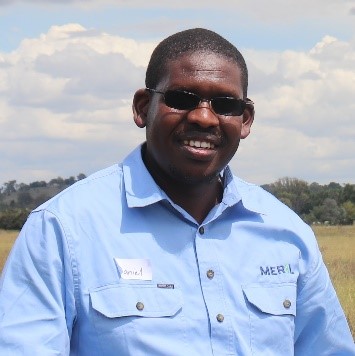Dr Daniel Korir Sitienei
Postdoctoral Research Fellow in Ruminant Nutrition - School of Environmental and Rural Science

Email: dsitiene@une.edu.au
Biography
Dr. Daniel Korir Sitienei is a postdoctoral fellow currently investigating nutritional strategies to reduce greenhouse gas emissions and improve animal productivity in sheep. Daniel holds a PhD in Agricultural Sciences with a specialisation in Animal Nutrition and Environmental Studies from University of Melbourne, Australia. He also holds a Master of Science in Livestock Production Systems and a Bachelor of Veterinary Medicine, both from the University of Nairobi, Kenya. Daniel’s primary research interests include the use of feed additives to reduce enteric methane emissions, ruminant nutrition, and circular agriculture. His current research focuses on investigating a combination of different feed additives with the goal of developing a product that is effective in reducing enteric methane emissions while simultaneously improving animal production. Daniel has published more than 10 peer-reviewed articles and over 20 conference papers.
Qualifications
PhD in Agricultural Sciences (University of Melbourne, Australia)
Masters of science, Livestock Production Systems (University of Nairobi, Kenya)
Bachelor of Veterinary Medicine, (University of Nairobi, Kenya)
Primary Research Area/s
Strategies for reducing enteric methane emissions in ruminants ; Ruminant nutritionResearch Supervision Experience
Daniel has supervised two masters students and currently co-supervising one PhD candidates.
Publications
- Idrissou, Y., Korir, D., Seidou, A. A., Worogo, H. S. S., Baco, M. N., & Traoré, I. A. (2023). Adapting cattle farming to climate change in the dry and sub-humid tropical zones in Benin: how adaptation strategies affect productivity. Revue d’élevage et de médecine vétérinaire des pays tropicaux, 76, 1-10. https://doi.org/10.19182/remvt.37118
- Korir, D., Ndung’u, P. W., Onyango, A., Arndt, C., Goopy, J., Marquardt, S., & Eckard, R. (2023). IPCC Tier 1 methodology overestimates the carbon footprint of smallholder cattle production systems in Kenya. Available at SSRN 4512704. https://doi.org/10.21203/rs.3.rs-3148140/v1.
- Korir, D., Marquardt, S., Eckard, R., Sanchez, A., Dickhoefer, U., Merbold, L., ... & Goopy, J. (2022). Weight gain and enteric methane production of cattle fed on tropical grasses. Animal Production Science, 63(2), 120-132. https://doi.org/10.1071/AN21327 .
- Graham, M. W., Butterbach-Bahl, K., du Toit, C. L., Korir, D., Leitner, S., Merbold, L., ... & Arndt, C. (2022). Research progress on greenhouse gas emissions from livestock in sub-Saharan Africa falls short of national inventory ambitions. Frontiers in Soil Science, 2, 927452. https://doi.org/10.3389/fsoil.2022.927452
- Korir, D., Eckard, R., Goopy, J., Arndt, C., Merbold, L., & Marquardt, S. (2022). Effects of replacing Brachiaria hay with either Desmodium intortum or dairy concentrate on animal performance and enteric methane emissions of low-yielding dairy cows. Frontiers in Animal Science, 3, 963323. https://doi.org/10.3389/fanim.2022.963323.
- Ali, A. I., Wassie, S. E., Joergensen, R. G., Korir, D., Goopy, J. P., Butterbach-Bahl, K., ... & Schlecht, E. (2021). Feed quality and feeding level effects on faecal composition in East African cattle farming systems. Animals, 11(2), 564. https://doi.org/10.3390/ani11020564.

